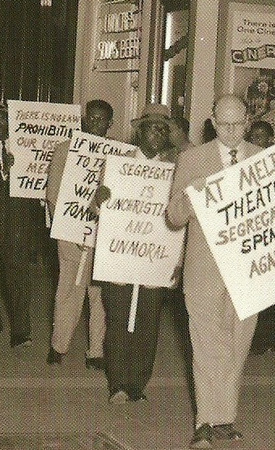Stone of Hope: Liberals and Prophetic Religion
by admin - October 25th, 2012
The first several chapters of David Chappell’s book introduce a broader cast of characters for the civil rights movement, including liberals who supported the movement but did not provide its motivating faith nor ensure its cohesiveness and intellectuals and thinkers who fit into the American “prophetic religion” tradition (which is long and fascinating – think about who might fall into that category today).
Link: Martin Luther King, Jr, “I Have a Dream” 28 August 1963 (full transcript and scriptural references here). By the way, the speech was not broadcast live on television. Only those who were there experienced it in its entirety; clips were broadcast later, but not live. Notice especially King’s rhetorical techniques of repetition, cadence, and emphasis – very preacher-like, of course – and pay attention to when and how the audience responds.
Slides from class on Wed 10/24 – Reading is Intro & Ch 1
 Fri 10/26 – Prophetic Religion: Reading is Ch 3
Fri 10/26 – Prophetic Religion: Reading is Ch 3
Mon 10/29 – The Civil Rights Movement as Religious Revival: Reading is Ch 4-5
Update: Hello everyone – a brief response paper is due on Friday, Nov 2nd. This is to have something in hand from which to discuss Chappell’s book so far. Please write 2-3 pages on one of these questions and be prepared to hand in what you write –
- Assess Chappell’s characterization of any of the three main groups of intellectuals (thinkers, strategists) he identifies during the civil rights movement: white liberals, black prophets and movement activists, and white supremacists. What kinds of sources is he using to craft his argument? Are you persuaded?
- How does this interpretation or retelling of the movement’s history square with (or not) your previous understanding of the movement?
- What does a religious perspective on the civil rights movement contribute to your current understanding of the movement?
- Discuss King’s “I Have a Dream” speech as an example of prophetic religion.
- Contrast 2 of the thinkers Chappell considers, and discuss how their ideas are important to the movement.
